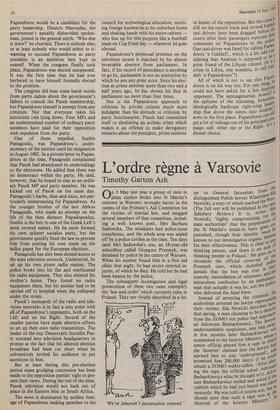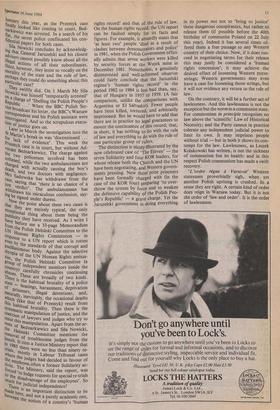L'ordre regne a Varsovie
Timothy Garton Ash
On 3 May last year a group of men in plain clothes broke into St Martin's convent in Warsaw, wrought havoc in the rooms of the Primate's Aid Committee for the victims of martial law, and mugged several members of that committee, includ- ing a well known poet. Mrs Barbara Sadowska. The assailants had police-issue truncheons, and the whole area was sealed off by a police cordon at the time. Ten days later Mrs Sadowska's son, an 18-year-old schoolboy called Grzegorz Przemyk, was detained by police in the centre of Warsaw. When his mother found him in a first aid clinic that night, he had severe internal in- juries, of which he died. He told her he had been beaten by the police.
The subsequent investigation and legal prosecution of these two cases exemplify the law and order' which currently rules in Poland. They are vividly described in a let- `We're Jehovah's prosecution counsel.' ter to General Jaruzelski from the 1a distinguished Polish lawyer Wladyslal'ict. Nowicki, a copy of which reached the vv",,,t (The full text will be published in the Sila Salisbury Review.) It is, writes Slhe Nowicki, 'highly compromising Or the state authorities' that the perpetrawrs the St Martin's break-in have gone %ea punished, though their identity ‘Ingslas known to our investigative organs, faal" for their effectiveness. This is clear to al thinking person, and there is no lack of thinking people in Poland.' He goes tithe chronicle the official cover-UP °` Przemyk case, which included 13°" denials that the boy was ever in ith,che custody, intimidation of witnesses, and `ce., miraculous confession by an ambulail, man that actually it was he, not the Polls whodelivred the fatal tithe criminals of arresting the crimin'is t11,,,ge authorities arrested the lawyer represent17 their victims. Sila Nowicki describeseser` n°,'"er that spring, a man claiming to be a dh, from the ZOMO riot police had apPoac4, ed Advocate Bednarkiewicz. The /awY'', understandably suspicious, sent him 013.;; A few months later Bednarkiewici h a summoned to the Interior Ministry, webricti senior official played him a tape in w"h'ad the 'deserter' claimed that the lawyer advised him to stay 'underground', promised him 200,000 zlotys if he Pis, obtain a ZOMO walkie-talkie. `After 10):, ing the tape the official asked Mvoea,! Bednarkiewicz what he thought of it. Ad'",se cate Bednarkiewicz smiled and asked rubbish which he had just heard was ta0; seriously. He was told of course not, but should note that such a tape was at, t'io disposal of the Interior Ministry.
January this year, as the Przemyk case
llY looked like coming to court, Bed- narkiewicz was arrested. In a search of his Vie, the secret police confiscated his con- fidential papers for both cases. Sila Nowicki concludes by acknowledg- ing that General Jaruzelski and his closest advisers cannot possibly know about all the illegal actions of all their subordinates. Since, however, they insist so vocally on the morality of the state and the rule of law, Perhaps they could do something about this Particular case? They swiftly did. On I March Mr Sila wn,icki was himself 'temporarily arrested, „ a charge of 'libelling the Polish People's rcepublic When the BBC Polish Ser- vice broadcast his letter, the BBC's Warsaw correspondent and his Polish assistant were interrogated. And so the scrupulous execu- n of justice goes on. fLater in March the investigation into the a Martin's break-in was 'discontinued for lack of evidence'. This week the Przemyk case is in court, but without A. d- vocate Bednarkiewicz. The charge against the two policemen involved has been softened, while the two ambulancemen are drged with actually causing the bey s ached and two doctors with negligence. Mrs Sadowska has withdrawn from the ease, saying that 'there is no chance of a Just verdict'. The ambulanceman has withdrawn his miraculous confession, say- ing he signed under duress. tk NOW " the point about these two cases is ‘`lat they are entirely typical, the only exceptional thing about them being the le.;
Publ rY they have received. As I write
lhave before me a 33-page Memorandum rjoal the Polish Helsinki Committee to the N Human Rights Commission — in resPonse i to a UN report which is rotten even by the standards of that corrupt and PUSalanimous body. Against the selective ril.Yorlia of the UN Human Rights emissa- r2es, the Polish Helsinki Committee (a e'r°4 of independent monitors inside the c),_untrY) carefully chronicles continuing 4,?Uses, "ese are broadly of two kind. s. state — beatings, harassment, deprivation _ Prisoners, illegal detentions, and, nwich atur
bally li, nevitably, the occasional deaths
,L (ke that of Przemyk) result from `uls habitual brutality. Then there is the 4Ystern. atic manipulation of justice, and the resist of lawyers and judges who try to resist this manipulation. Apart from the al:- tests h Hednarkiewicz and Sila Nowicki, e Helsinki Committee mentions the b.elnoval of troublesome judges from the juerich. It cites a Justice Ministry report that tr' 1983 there were no less than ninety re- th rrinsrly in Labour Tribunal cases ere the judges had decided in favour of eMPloyee, often a former Solidarity was .?ree1 d `to lodge requests for special re-trials _0 the disadvantage of the employees'. So ran,...ch for judicial independence!
nel rr here is an important distinction to be between here, a nd not a purely academic one, ween the notion of a country's 'human
rights record' and that of the rule of law. On the human rights record, the UN report can be faulted simply for its facts and figures. For example, it absurdly states that 'at least two' people 'died as a result of clashes between demonstrators and police' in 1981, when the Polish Government offici- ally admits that seven workers were killed by security forces at the Wujek mine in December 1981. Nonetheless, a genuinely disinterested and well-informed observer could fairly conclude that the Jaruzelski regime's 'human rights record' in the period 1982 to 1984 is less bad than, say, that of Hungary in 1957 to 1959. (A fair comparison, unlike the comparisons with Argentina or El Salvador). Fewer people have been killed, tortured, and arbitrarily imprisoned. But he would have to add that there are in practice no legal guarantees to ensure the continuance of this record; that, in short, it has nothing to do with the rule of law and everything to do with the rule of one particular group of rulers.
The distinction is nicely illustrated by the now celebrated case of 'The Eleven' — the seven Solidarity and four KOR leaders, for whose release both the Church and the UN have been negotiating, and Western govern- ments pressing. Now these prize prisoners have been formally charged with (in the case of the KOR four) preparing to over- throw the system by force and to weaken the defensive capability of the Polish Peo- ple's Republic' — a grave charge. Yet the Jaruzelski government is doing everything in its power not not to 'bring to justice' these dangerous conspirators, but rather to release them (if possible before the 40th birthday of communist Poland on 22 July this year). Indeed it has several times of- fered them a free passage to any Western country of their choice. Now, if it does suc- ceed in negotiating terms for their release this may justly be considered a 'human rights concession'; it may achieve the desired effect of loosening Western purse- strings; Western governments may even have a case for loosening those strings,, but it will not evidence any return to the rule of law.
On the contrary, it will be a further act of lawlessness. And this lawlessness is not the exception but the norm in a communist state. For communism in principle recognises no law above the 'scientific' Law of Historical Necessity; and the Party cannot in practice tolerate any independent judicial power to limit its own. It may imprison people without trial — but in both it shows its con- tempt for the law. Lawlessness, as Leszek Kolakowski has written, is not the sickness of communism but its health: and in this respect Polish communism has made a swift recovery.
`L'ordre regne a Varsovie' Western statesmen proverbially sigh, when yet another Polish uprising is crushed. In a sense they are right. A certain kind of order does reign in Warsaw today, But it is not the order of 'law and order'. It is the order of lawlessness.













































 Previous page
Previous page